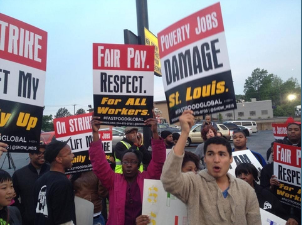
“We Want Change and We Don’t Mean Pennies.”
Meg Olson
May 18, 2021
On Wednesday, May 19, McDonald’s workers in the Fight for $15 are going on strike in 15 cities across the country. Their demand? That “every worker who wears the McDonald’s uniform” makes at least $15/hr.
If that seems shocking or radical, consider this: last year, McDonald’s earned nearly $5 billion in profits, and paid shareholders nearly $4 billion in dividends. Meanwhile, thousands of their workers—essential workers—received an average of $10/hour, just over $20,000 a year for a full-time employee, without health or dental benefits or access to paid sick leave.
McDonald’s worker and Fight for $15 Organizer Ieshia Townsend said, “Some workers ask me why I do what I do and I tell them, ‘The reason I do what I do is so I can make a better life for my kids and your children, and our next generation. You should be able to go on family vacations and spend time with our kids if they get sick. We should not have to keep living in poverty.”
Fast food workers, who have been essential workers during the COVID-19 pandemic, are struggling to survive. Every day, these workers are forced to make decisions between basic needs such as food, medicine, and transportation. Many of them work two and even three jobs and are still unable to make ends meet, especially when it comes to housing. The National Low Income Housing Coalition’s 2020 Out of Reach Report, finds that in Illinois, where the minimum wage is $10/hour, one would have to work 72 hours a week to be able to rent a 1-bedroom apartment at fair market rent without spending more than 30% of income on housing. In Mississippi, where the minimum wage is the federal rate of $7.25/hour, a worker would have to work 68 hours a week.
The good news is that the Fight for $15 is working! Since Fight for $15 started in November 2012, workers in the fast food industry and other minimum-wage jobs have led the movement for the passage of $15 minimum wage laws in states such as California, New York, and Massachusetts, as well as the District of Columbia, and cities as diverse as Flagstaff, Arizona, St. Paul, Minnesota, and Seattle, Washington. In 2018, the National Employment Law Project reported that “22 million workers [had] won $68 billion in raises” thanks to the movement. Unfortunately, legislatures in states such as Florida, Missouri, and Kentucky fought back against the workers’ efforts and passed preemption laws that kept cities from raising their wages. This is why Fight for $15 is now focusing its efforts on McDonald’s.
I first got involved with the Fight for $15 in 2013, when I was the diocesan director of the Catholic Campaign for Human Development in St. Louis and a member of Missouri Jobs with Justice Faith and Labor Coalition. While it was thrilling to strike and shut down a McDonald’s or Wendy’s at 5:00AM, my participation in the movement was also a steep lesson in the principle of Subsidiarity. Catholic Social Tradition teaches us that Subsidiarity means that the people who are most injured by the injustice should have the dominant voice in creating a solution. Fight for $15 is a worker-led movement that truly embodies Subsidiarity. The workers are, to quote Pope Francis, “social poets” and “protagonists of their own destiny.” We faith leaders, an interfaith coalition of clergy, vowed religious, and laypeople, learned to listen, step back, and support the workers. This meant driving around the city the day before the strike delivering notices to surly store managers, letting them know that their employees had the legal right to strike. It meant babysitting children and serving snacks and cold water on hot days. It also meant accompanying workers when they returned to their first shift after the strike.
Faith leaders also had the responsibility of holding the fast food restaurants accountable if they retaliated against the workers. Once, one of SEIU’s lawyers called and told me that an Arby’s near my workplace was threatening to fire one of the workers, a young woman and mother of two. “Would you be willing to make a bunch of noise with other people of faith tomorrow? Are you willing to be arrested?” I told him yes. When we arrived at the Arby’s the next day, we were greeted by an H.R. Director from corporate headquarters who assured us that the managers now understood the labor laws.
Every time we gathered on a strike day, the workers asked to pray. Workers I talked to explained how working multiple jobs and second and third shifts made it nearly impossible to go to church. “So this is our church!” This was my ultimate lesson: for people of faith, the call to be in solidarity with workers means not just avoiding certain stores or companies, or hitting the streets, but also figuring out how to make Church fully inclusive to the low-wage workers, even if that means holding a service at 2:00 AM. Until then, “this is our church.”
To participate in a Fight for $15 day of action in your city, please visit https://actionnetwork.org/event_campaigns/15hr-day-of-action.
Email your Members of Congress to pass the Raise the Wage Act
www.networklobby.org/actnow.







